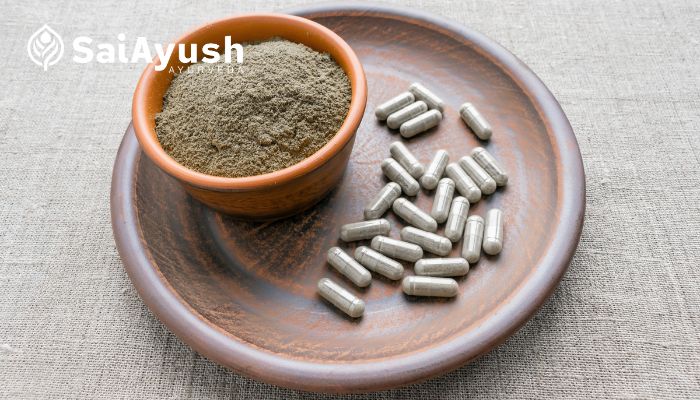Managing uric acid levels is crucial for preventing gout and other related health issues. At Sai Ayush Ayurveda Hospitals, we offer holistic Ayurvedic solutions designed to naturally balance uric acid levels and promote overall wellness.
Several health issues can be caused on by elevated uric acid levels:
- Gout: A form of arthritis characterized by sudden and severe pain, redness, and swelling in the joints, commonly affecting the big toe.
- Kidney Stones: High uric acid levels can lead to the formation of crystals in the kidneys, causing painful kidney stones.
- Kidney Disease: Chronic high uric acid can damage the kidneys over time, leading to kidney dysfunction.
- Joint Damage: Repeated gout attacks can cause joint damage and deformities if not properly managed.
- Increased Risk of Heart Disease: Elevated uric acid levels have been linked to a higher risk of cardiovascular conditions.
What Are the Main Uses of Ayurvedic Medicine for Uric Acid?
Ayurvedic medicine aims to manage uric acid levels through:
Reducing Uric Acid Levels: Herbal treatments and dietary changes to lower elevated uric acid.
Preventing Gout Attacks: Techniques to avoid the painful flare-ups associated with high uric acid.
Enhancing Kidney Function: Improving kidney health to better eliminate uric acid from the body.
Health Benefits of Ayurvedic Medicine for Uric Acid Based on Research:
Lower Uric Acid Levels: Herbs such as Guggul and Punarnava help to lower high uric acid levels in the blood.
Reduced Inflammation: Turmeric and Ginger reduce inflammation and ease joint pain caused by gout.
Improved Kidney Function: Triphala and Karela boost kidney health, improving the body’s ability to remove excess uric acid.
Top 10 Ayurvedic Medicines for Uric Acid
Here are ten highly recommended Ayurvedic remedies for managing uric acid:
- Guggul: Helps reduce uric acid levels and supports joint health.
- Punarnava: Known for its diuretic properties, aiding in the elimination of uric acid.
- Turmeric: Contains curcumin, which reduces inflammation and supports joint health.
- Ginger: Reduces inflammation and pain associated with high uric acid.
- Triphala: Enhances kidney function and helps in detoxification.
- Karela (Bitter Melon): Helps regulate blood sugar and manage uric acid levels.
- Nettle Leaf: Has anti-inflammatory effects and supports joint health.
- Celery Seeds: Reduces uric acid levels and helps with kidney function.
- Ashwagandha: Supports overall health and helps in managing stress, which can affect uric acid.
- Neem: Detoxifies the body and helps in reducing uric acid levels.
Ayurvedic therapies offer natural and holistic approaches to managing and controlling uric acid levels. Here are some effective Ayurvedic therapies for controlling uric acid:
Dietary Adjustments
Low-Purine Diet: Avoid foods high in purines, such as red meat and seafood, and focus on low-purine foods like fruits, vegetables, and whole grains.
Hydration: Drinking plenty of water helps flush out uric acid from the body.
Lifestyle Changes
Regular Exercise: Engaging in physical activities like yoga can help maintain a healthy weight and reduce uric acid levels.
Stress Management: Practices like meditation and relaxation techniques can help lower stress, which can influence uric acid levels.
Ayurvedic Supplements
- Triphala: A combination of three fruits that supports digestion and detoxification, aiding in uric acid management.
- Karela (Bitter Melon): Helps regulate blood sugar and supports overall metabolic health.
Incorporating these Ayurvedic therapies into your routine can help manage uric acid levels and improve overall health. For specific recommendations and treatment programs, it is best to speak with an Ayurvedic doctor.

Ayurvedic Pills to Regulate Urinary Acidity
Ayurveda Kerala Panchakarma Therapy for Uric Acid
Kerala Panchakarma therapies are effective for managing uric acid through:
Abhyanga: A full-body oil massage that enhances circulation and supports detoxification.
Virechana: A purgation therapy that helps cleanse the digestive tract and lower uric acid levels.
Pizhichil: Warm oil baths that soothe joints and improve overall health.
Elakizhi: Herbal poultices applied to the body to relieve muscle tension and support joint health.
FAQs
Q:What is Ayurvedic medicine for uric acid?
Ayurvedic medicine for uric acid involves using natural herbs and therapies to manage and reduce elevated uric acid levels, preventing gout and other complications.
Q:How can Ayurvedic remedies help manage uric acid?
Ayurvedic remedies help by lowering uric acid levels, reducing inflammation, and improving kidney function through natural, holistic approaches.
Q:What are the top Ayurvedic medicines for uric acid?
Top Ayurvedic medicines include Guggul, Punarnava, Turmeric, Ginger, and Triphala, known for their benefits in managing uric acid levels.
Q:What dietary changes can help with uric acid?
A diet for managing uric acid should include low-purine fruits and vegetables, whole grains, lean proteins, and plenty of water, while avoiding high-purine foods and sugary drinks.
Q:How does Kerala Panchakarma therapy help with uric acid?
Kerala Panchakarma therapies like Abhyanga, Virechana, Pizhichil, and Elakizhi help detoxify the body, enhance circulation, and relieve joint pain associated with high uric acid levels.
Discover the healing power of Ayurveda with our latest article at Sai Ayush Ayurveda Hospitals! Dive into the age-old wisdom that can rejuvenate your body and mind. Click here to read more:



0 Comments